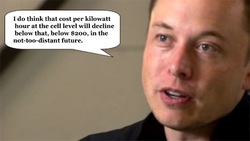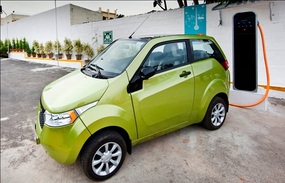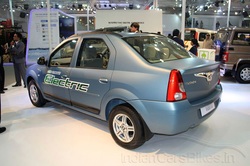 Polluted Indian Roads
Polluted Indian Roads
I have used public transport all my life.
But looking at people, who don't care and buy SUVs, sometimes i think whats the point?
How am i making a difference? And how am i benefiting?
The government does not provide any tax benefit for me, for not using a gas guzzling vehicle. I walk through the polluted Indian cities and breathe in the polluted air to catch a bus, while i see colleagues zoom in their AC cars.
But something has always kept me going.
There was a deep intuition that kept telling me bout the environment and air quality. It kept telling me to set an example.
I was never interested in gas cars or motor bikes. It all changed when i watched 2 awesome documentaries -
'Who killed the electric Car' and 'Revenge of the electric Car'
http://en.wikipedia.org/wiki/Who_Killed_the_Electric_Car
http://en.wikipedia.org/wiki/Revenge_of_the_Electric_Car
And ever since, am sold on the concept of electric mobility and i wait with bated breath on every bit of breakthrough or product launches that goes on around the world. I often wondered if there will be a change...But of late there is a silent revolution happening and lets all get ready for the electric invasion!
This blog is all bout educating people on the need to look beyond oil.
 World drowning in OIL
World drowning in OIL
Here are few of the best alternative fuels that can be used for automobile propulsion
a) Ethanol
Ethanol is an alcohol-based alternative fuel that is made by fermenting and distilling crops such as corn, barley or wheat. Ethanol can be blended with gasoline to increase octane levels and improve emissions quality.
We still have emissions and its not as if there are vast swathes of arable land that is available in our Earth to grow Ethanol instead of food production.
b) Natural Gas or CNG
Natural gas is an alternative fuel that burns clean and is already widely available. When used in natural gas vehicles—cars and trucks with specially designed engines—natural gas produces far fewer harmful emissions than gasoline or diesel. But there are emissions nevertheless.
c) Hydrogen
Hydrogen is also used in fuel-cell vehicles that run on electricity produced by the petrochemical reaction that occurs when hydrogen and oxygen are combined in the fuel “stack.”
The reliable and steady source of hydrogen will have to be a hydrogen pipe line coming from a hydrogen purifier company. This is impossible for now because we do not have hydrogen pumps at local gas stations or hydrogen pipe lines coming into our houses. It will also take billions of dollars of investment and a long time for all local gas stations to have a hydrogen pump.
d) Electricity
As compared to the above 3, an electric powered vehicle stores energy in a battery and that energy is used to spin an electric motor which in turn propels the automobile.
There are 0 tail pipe emissions. Electricity is available in all homes and offices in all cities around the world. Even if electricity is generated from coal fired power plants, the efficiency of the electric powered engine ensures that there are benefits.
Electricity can be generated form renewable sources like Hydro, Solar and Wind. In that case your electric powered vehicle will be the cleanest mode of transport.
Thus electric mobility is the best option we have now to get over the usage of oil.
Why do we need Electric Mobility?
- We need to clean up the air of our cities. Automobiles cause half of the pollution in our cities. The pollution in the air contributes to Asthma, threatens our children, accounts for lots of problems for elderly people.
What we are seeing here for the first time, is that by electrifying our vehicles, there remains a possibility of eliminating pollution from our cities.
If we can achieve that we will solve this first problem.
- Dependence on foreign oil
In 2011, India was the fourth largest energy consumer in the world after the United States, China, and Russia.
We imports 85% of our oil today. We are also the world’s fifth largest net importer of oil, importing more than 2.2 million barrels a day, or about 70 percent of consumption. A majority of our crude oil imports come from the Middle East, with Saudi Arabia and Iran supplying the largest shares. We spent close to 140 billion $ on foreign oil in 2011/12.
Most of this is to drive our transport and our vehicles.
If we are able to plug in our vehicles, and use electricity that would be generated at home, we would enrich our economy by keeping that wealth here and using that money for much needed social welfare.
So if by electrification of our transport we say reduce our oil imports from say
140 billion $ per year to say 40 billion $, that would be a savings of 100 billion $ every year. So over a period of say 20 years, u do the math and see the savings.
- Protect the environment
Carbon monoxide, nitrogen oxides, and hydrocarbons are released when fuel is burned in an internal combustion engine and when air/fuel residuals are emitted through the vehicle tailpipe. Gasoline vapors also escape into the atmosphere during refueling and when fuel vaporizes from engines and fuel systems caused by vehicle operation or hot weather.
Some air pollutants and particulate matter from cars can be deposited on soil and surface waters where they enter the food chain; these substances can affect the reproductive, respiratory, immune and neurological systems of animals.
Greenhouse gases are those gases that are able to absorb heat radiation in the infrared range, such as thermal radiation emitted by the sun. Since car pollution increases the concentration of greenhouse gases in the atmosphere, more of the sun's heat is captured and retained by the atmosphere, leading to an increase in global temperatures or global warming.
As you see this cannot go on forever. The environment issues will really hit the developing countries with huge populations. Countries like India, China have already reached the tipping point and should seriously consider alternative modes of transport.
 Elon Musk - CEO of Tesla Motors
Elon Musk - CEO of Tesla Motors
"If we don't soon solve this problem of using oil for our transportation, we are fracked!"
 The Mahindra e2o
The Mahindra e2o
and the reasons to be optimistic!
- High initial cost.
Electric vehicles cost less to operate than gas-powered ones, but that economic advantage largely disappears in the face of expensive batteries.
Mahindra Automative released the Mahindra e20 electric car (mahindrae2o.com) which costs almost Rs 8 Lakhs in all Indian cities except Delhi (where the state government offers subsidies).
An Indian consumer would immediately look at the sticker price and experience an immediate sticker shock!
When it comes to motor bikes or scooters, there are companies like Yo Bikes (http://www.yobykes.in), Hero Electric (http://www.heroelectric.in) who have decent products. They are again expensive as compared to the similar gas bikes.
Our society is extremely price conscious and people would not want to pay so much for a car that does less (in their minds. More on that later!)
Reason to be positive - The cost of the batteries are dropping quiet rapidly. They have dropped in half over the last 4 years and experts say that the costs of the batteries will drop another half over the next 4 years. So when the cost of the electric vehicle batteries have dropped enough , the incremental cost of an electric vehicle will not be that much higher than a gas vehicle.
- Absolute lack of options!
Mahindra e20 in the only electric car option, Indian consumers have as of April 2013!
So you have an option to choose between 1 electric car and a gazillion cars with internal combustion engines. This is a problem.
When it comes to bikes and 2 wheeler's we have decent options but yet we don't see them on the roads.
Reason to be positive - Mahindra have announced that they will launch the electric sedan called - The Mahindra Verito electric in 2014. Mahindra will also launch the electric versions of the compact truck Gio and minivan Maxximo.Mahindra seems to be the only option for electric consumers.
As of now, there is no news bout Nissan getting their Leaf electric car into the Indian market. Same applies with Tesla. But they could enter the market and change things.It also remains to be seen, if this push by Mahindra will spur other Indian manufacturers like Tata and Maruti to go electric. The more competition we have, the better.
 Mahindra Verito Electric
Mahindra Verito Electric
- Lack of Infrastructure to support clean vehicles
Will commercial entities, say Starbucks or a Petrol station or a Cafe Cofee Day or a Mall, provide facilities to install an electric charging option to allow us to plug in our cars in our cities?
Will our government, our city municipal corporations provide these charging facilities?
Will the car companies take the responsibility to provide this infrastructure?
Mahindra have installed more than 100 charging points in cities like Delhi, Bangalore
etc. They plan to do the same in other cities. As for commercial entities to offer these
charging stations, there will have to be regulatory change from our government which
can ensure the commercial establishments can provide charging facilities.
We can just hope, this will happen soon.
- Battery technology and Range anxiety
Batteries are expensive. Lithium is a rare mineral and making the Lithium Ion battery pack is a major cost of the electric car. Thus the range of an electric car will always depend on the amount of Lithium ion cells that are stacked in in the car. More range will mean more cost.
Reason to be positive - In the beginning the cost of the batteries was higher as it was new technology and industry was having to spread over the cost of developing the technology. But as we are going forward here the cost of the batteries have dropped dramatically.They have dropped in half in the last 4 years. Experts in the field say that they will drop further in the next 4 years.Hopefully soon, we will reach a point where the incremental cost of an electric vehicle will compare to that of an internal combustion engine and we will start having vehicles with higher ranges.
- Lack of government support
The Indian government as of April 2013 does not provide any support or subsidy for electric vehicles. This is such a shame.
The world over every government provides subsidies and rebates on electric vehicles and we don't have any.
Reason to be positive - The National electric mobility mission plan 2020 was announced this January where the government has plans to provide support to the tune of Rs 13000 – Rs 14000 Crore over the next 5-6 years to the automobile industry, the consumers etc.So we can expect support from our government very soon.

- The cost of maintaining an electric car/bike is very less as compared to a gas car/bike.
Electric cars have 70% fewer moving parts than cars with internal combustion engine. No ignition, gas tank, oil filter, catalytic converter, or muffler, to name a few unneeded parts. There's less to go wrong, so less to service and a longer life: no oil changes or tune-ups. Thus the annual maintenance costs will be dramatically less.
- Dont focus on the sticker price of an electric car/bike!
Think bout the cost of owning the car for the next say 5 years.
The more number of people who think bout the cost of ownership of an electric car the over a period of time than the sticker price, the better information people would have.
For example an EV consuming 10 units of power per charge which would drive you for 100kms at the rate of Rs 5 per unit of power, will cost you Rs 50.
An gas car with a mileage of say 20kms per liter will need 5 liters of petrol to drive 100 kms. At 75 Rs per liter, you do the math and you see the cost benefits of owning an electric car.
- An Electric car/bikes cannot be used on long trips and thus is limited!
Ask yourself this question. Is OIL unlimited?
Ok, in a year how many trips does an average family make with their own
car outside the city?
95% of the kilometers an average Indian family uses a vehicle is for trips inside the city and the rest for trips out of town.
And the trips made inside the city with an electric car is where you save money.
- By owning an electric vehicle, are you not transferring the pollution from the streets to the areas that generate coal power plants?
In a way this is true, but consider this
An electric motor is 40% more efficient than an internal combustion engine.
The most efficient internal combustion engine convert bout 20% energy in the gasoline into motion power.
A power plant converts bout 40% of the energy in the fuel into electricity. When it comes to electric motors in a car or a bike, you use 40 percent less energy with each kilometer you drive.
Thus the whole system is so much more efficient.
Even though your power is generated using coal, as the electric motor is so much more efficient, you get a benefit.
What is even more important is this
As we clean up our grid from Coal to Natural Gas to Wind or Solar, your electric vehicle would get cleaner year by year.
- You can run on clean and free energy right now!
Have a solar system on your roof of your home, plug in your vehicle and powering it from the Sun! You can do it now!
- Electric vehicles are fun to drive
All of them have automatic transmission. As there are less moving parts, the car is quieter. The instant torque of electric vehicles cannot be managed by any gas powered vehicle.

- Look at the bigger picture - Its not bout you and your comfort. You are no one in the grand scheme of things!
If we keep in mind bout this we are just sucking
our wealth out of our economy and sending this
to countries who don't even like us! Everyone can do our bit by helping our country to keep this 140 billion $ in our country. That would create more jobs and industries and other social welfare schemes.
When we think bout the kind of world we are creating for our kids, providing better industries and jobs and this is part of that. Its bout producing our own energy and getting us off this dependence of
oil. This will be a huge benefit for the future.
So if you are in the market to buy a car/bike, and u see 2 vehicles (1 Petrol and 1 Electric) both at similar price range or even if the electric flavor costs a little more, go for the electric version and do your bit in saving the world and setting an example!
